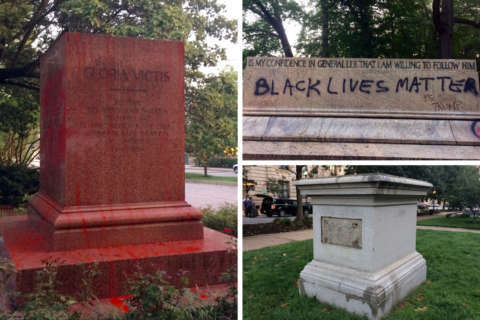WASHINGTON — A day after Baltimore removed four controversial memorial statues overnight following the attacks in Charlottesville, Virginia, many cities, including D.C., are considering doing the same. A historian is weighing in on where cities can draw the line between respecting civil rights and erasing the past.
Grace Elizabeth Hale, a professor of Southern culture and U.S. history at the University of Virginia, is familiar with the debate over the future of confederate statues — most of which, she said, were erected in the 1910s and ’20s.
“It’s not a new thing,” Hale said of the desire to remove Confederate and other statues. “People have called for these things before, in the time period from the Civil Rights period forward. … It certainly has more mass support now, so that’s different.”
She explains why the time in which statues were erected can inform the decision as to whether to remove them.
“These statues are very much about the time period in which most of them were put up. They’re very much about justifying the white supremacist racial order being created at that time. It’s not slavery, but it’s segregation and Jim Crow,” she said.
Hale thinks we can draw the line regarding the removal of a name or statue by reflecting on what achievements are being commemorated.
Referring to President Donald Trump’s comments Tuesday about where the removal of statues might stop, Hale said, “I would argue we’re not celebrating George Washington and Thomas Jefferson because they were slaveholders. But I think the reason that they are commemorated or memorialized is because of their role in founding the nation and we need to look at that in all its complexity — in how people could support freedom and also own slaves …
“But that is not the same thing as celebrating Confederate generals; people who took up arms against the central government for the preservation of slavery.”







